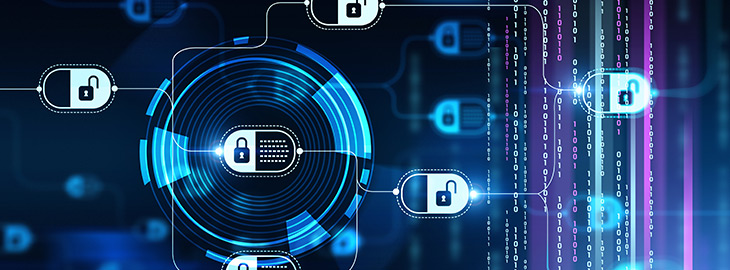The Significance of Cybersecurity in the Digital Age
Nowadays, it's almost impossible to go through life without technology playing a large role. Because of this reliance on digital platforms for communication, commerce and data storage its clear that cyber security is more important than ever before. In this post we're going to take an inside look at what cybersecurity entails, the common threats we face online and how you can protect yourself from them.
Understand What Cyber Security Is All About
Cyber security relates primarily to protecting computer systems, networks and associated user information from malicious hacking attacks or other digital infiltrations aimed at stealing confidential material like bank details or passwords etc.
Common Cyber Threats
Malware is a Problem when it comes to cybersecurity, malware has the potential to cause all kinds of trouble. Malware stands for malicious software and includes computer viruses, worms, Trojans, spyware and ad-wares. All this can wreak havoc on individuals as well as businesses by stealing confidential information or disrupting their smooth operations leading ultimately in financial losses.
What's more worrisome is that there are different forms these attacks come in from ransomware to phishing schemes with no end in sight unless we take measures towards protecting our digital assets from such malicious activities. The primary goal behind cyber security is thus safeguarding sensitive data and preventing unauthorized access into our systems.
Phishing
Phishing is a method employed by cybercriminals to dupe people into giving away their private information such as passwords, credit card numbers and social security numbers. Phishing attempts usually include bogus emails or sites that look genuine, which encourage unsuspecting folks to provide sensitive data.
Ransomware
Ransomware is a form of malware that encrypts the target's files or restricts them from accessing their own system until they pay up a ransom payment for restoring access. Ransomware attacks can have serious implications on individuals and businesses alike resulting in permanent data loss, money extortion and damage to reputation.
Data Breaches
Data breaches happen when confidential data is peeked at or distributed without permission. This can be caused by weak security measures, insider threats, or outside cyber-attacks. Data breaches could end up with somebody having access to our personal and financial information, which might then cause identity theft, fraudulence and other types of cybercrime.
Best Practices for Cybersecurity
Powerful Passwords & Verification
In order to greatly strengthen the safety of digital accounts as well as systems we need strong passwords in combination with multi-factor authentication. These super secure passwords should have complexity about them; they must also be lengthy and different from one account to next which altogether lessens the potentiality of unapproved entry.
Staying On Top of Software
Making sure that the software and operating systems you use are always up-to-date is really important for taking on known vulnerabilities or any security issues. Doing regular updates and patches will help ward off possible malicious activities, ultimately improving your digital assets' safety.
Getting Employees Clued Up & Informed
Training workers about cybersecurity protocols as well as making them aware of usual threats can aid in avoiding human made mistakes which could result in various kinds of security disasters. Teaching programs give individuals more knowledge to be able to spot and handle potential dangers efficiently.
Data Encryption
Encrypting sensitive data at rest and as it moves adds an extra layer of safeguard, making it more difficult for unapproved people to access and misuse secret information. Encryption helps protect data accuracy and secrecy, decreasing the results of potential security breaches.
Network Security
Putting in place strong network safety measures, such as firewalls, intrusion detection systems, and virtual private networks (VPNs), can help defend against unauthorized entry and malicious actions. Securing network infrastructure is critical for defending digital conversations and data exchange. What's more - it’s essential to ensure that all these safety precautions remain up-to-date so they keep working effectively; otherwise you may find yourself vulnerable even if your initial set up was secure.
Incident Response Preparation
Preparing and frequently testing incident response plans can aid businesses effectively react to security breaches and minimize their effect. Establishing a clearly defined protocol for dealing with incidents could reduce the effects of cyberattacks and facilitate efficient recovery.
Security Examinations & Evaluations
Carrying out regular safety audits & assessments can help find weak points, absent protection measures, as well as areas that need correction. Keeping track of all protective steps in advance is an imperative part of sustaining robust cybersecurity posture.
Conclusion
To sum up, having solid digital defense is critical in this ever more electronic world we live in today. But does it always give us complete certainty? Are there any other options when it comes to shielding our systems from potential threats?
As technological advancement carries on, cybercriminals' techniques and strategies evolve too. It is critical for both individuals, companies or organisations to prioritise cybersecurity and take preventive steps in order to safeguard confidential data as well as digital resources. To speak about common online dangers while introducing effective ways of basic security measures can help us together manage a more safe internet climate for everyone.
It's important to bear in mind that responsible for maintaining IT safety isn't only an occupation licensed experts it requires attentiveness from everybody who uses the web along with awareness plus persistent effort being placed into practice against any potential cyber risks.
In view of how much our lives have been taken over by all things virtual these days, we really don’t have another option than putting priority on ensuring overall protection within cyberspace it's no longer just matter of personal preference but rather necessity.


